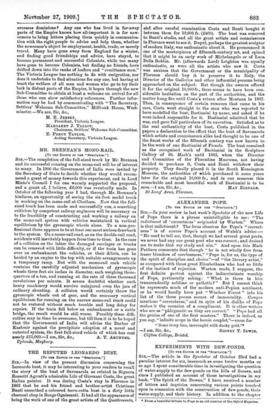ALEXANDER POPE.
[To THIL EDITOR Of THE " SPECTATOR."] Stu,--Tn your review in last week's Spedator of the new Life of Pope there is a phrase unintelligible to me : " The indictment of `correctness' originated by Warton." Where is that indictment P The locus classicus for Pope's " correct- ness " is of course Pope's account of Walsh's advice :- " He used to tell me, that, though we bad several great poets, we never had any one great poet who was correct ; and desired me to make that my study and aim." And upon this Mark Pattison comments that though " he is not wholly free from lesser blunders of carelessness," "Pope is, for us, the type of the spirit of discipline and choice"—of "the literary artist," as compared with those great Elizabethans who had so little of the instinct of rejection. Warton made, I suppose, the first definite protest against the indiscriminate worship of Pope, pertinently asking : " What is there in him transcendently sublime or pathetic ? " But I cannot think he represents much of the modern anti-Popian sentiment, or he would hardly have put " Windsor Forest " into his list of the three poems secure of immortality. Cowper mentions "correctness," and in spite of his dislike of Pope makes it the occasion of a compliment. It is other writers who are as "phlegmatic as they are correct." "Pope had all the genius of one of the first masters." There is indeed, as you say, "infinite scope in the heroic couplet,"—room for "Some ivory line, inwronght with dusky gold."*














































 Previous page
Previous page